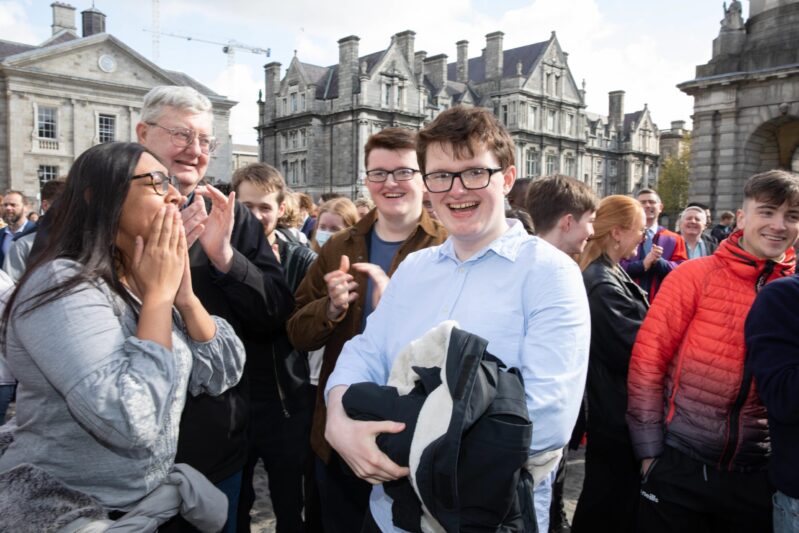Provost Linda Doyle has announced the names of Trinity’s 51 newly elected scholars in the first full in-person ceremony since 2019.
Doyle also announced the election of 31 Fellows, five Professorial Fellows and two Honorary Fellows.
The number of scholars marks a decrease from last year, when 73 were elected.
Speaking at the ceremony on the steps of the Public Theatre in Front Square, Doyle said: “On behalf of the Trinity community, I want to congratulate all the students and staff who have been named Scholars and Fellows today. We know how much hard work has gone into achieving this and we commend you for it.”
“We are proud of everyone who put their names forward for Fellowship, and everyone who sat the demanding Scholarship exams. Tá comhghairdeas tuillte ag gach duine.”
Often described as the most prestigious undergraduate award in the country, Schols comes with a range of perks:Scholars are granted accommodation on campus or in Trinity Hall free of charge, have their tuition fees paid for and can attend Commons every day for free.
The staff members elected Fellows are Gizem Arikan, Clodagh Brook, Thomas Chadefaux, Ashley Clements, Emma Creagh, Ivana Dusparic, Aisling Dunne, Paul Eastham, Roja Fazaeli, Max Garcia-Melchor, John Goold, David Hevey, Stephanie Holt, Joan Lalor, Jan Manschot, Nicola Marchetti, Rachel Moss, Cian O’Callaghan, Nessa O’Connor, David O’Regan, Edna Roche, Joseph Roche, Juan Diego Rodriguez-Blanco, Tomas Ryan, Jan Skopek, Hitesh Tewari, Daniela Tropea, Patrick Walsh, Rachael Walsh, Margaret Walshe and Fiona Wilson.
The Professorial Fellows elected are Andrew Davies, John Dong, Daniel Kilper, Noel McCarthy and John Divers.
The new Honorary Fellows are author Sebastian Barry and Irish language literature scholar Máirín Nic Eoin as Honorary Fellows.
Barry studied English and Latin in Trinity and served as Writer Fellow in 1995-6. He is an accomplished dramatist but is best known for his novels, including The Secret Scripture, which was shortlisted for the Man Booker Prize and won the James Black Tait Memorial Prize in 2009.
Nic Eoin is a world-leading scholar of modern Irish language literature. She is Professor Emerita of Irish in Dublin City University, and has authored a number of seminally important works in the subject, including three monographs which are milestones in modern Irish literary criticism.
This year marked the return of in-person Foundation Scholarship (Schols) examinations, following last year’s move to an online, proctored system as a result of the coronavirus lockdown.
College rejected calls to keep the exams online, pushing ahead with the traditional format despite a letter that made the request signed by 59 second year students addressed to Senior Lecturer David Shepherd.
In response, Shepherd said that “an important part of this return to normality is a resumption of long-established assessment practices, including in person exams across the University and not least, for the purposes of awarding Foundation Scholarships”.
The original letter from the students asked for clarity on the arrangements for Schols exams and argued that, after learning online for 18 months, students should be able to sit the exams in the same format.
The 51 new scholars announced today are: Eimhin O’Neill, Hamna Fathima, Ciaran Flynn, Bríd Murphy, Justine Alpuerto, Hannah Kent, Rola Wadullah, Jamie Taylor, Kumud Gogna, Martin McCormack, Aoife Cronin, Erica Smith, Conor Bowler, Eoghan Manning, Nollaig McHugh, Jakub Pstrusiński, Esme Dunne, Brídín Ní Fhearraigh-Joyce, Olivia Mangum Lehmann, Sinziana Stanciu, David Wolfe, Lisa Kelly, Andrew Cunningham, Niamh Harkin, Mark McGrane, Kathryn Polson, Aoife Purewal, Amy Cox, Fiona Stenson, James Murphy, Archie Connolly, Marie Cormican, Frank Crossan, Eleanor Murchan, Christopher Murray, Siobhan Trimmer, Catherina O’Dowd, Alessandro Loro, Devon Campbell, Katherine Cooling Reid, Catherine Dawson, Rachel Muldowney, Billy Brennan, Molly Carroll, Rían Cody, Francis Wolfe, Leon Kerin, Yun Sang Cheung, Robert Crossan, Yueying Wu and Grace Kehoe.







